ITS Lecturer Team Boosts Porang Productivity through Abmas
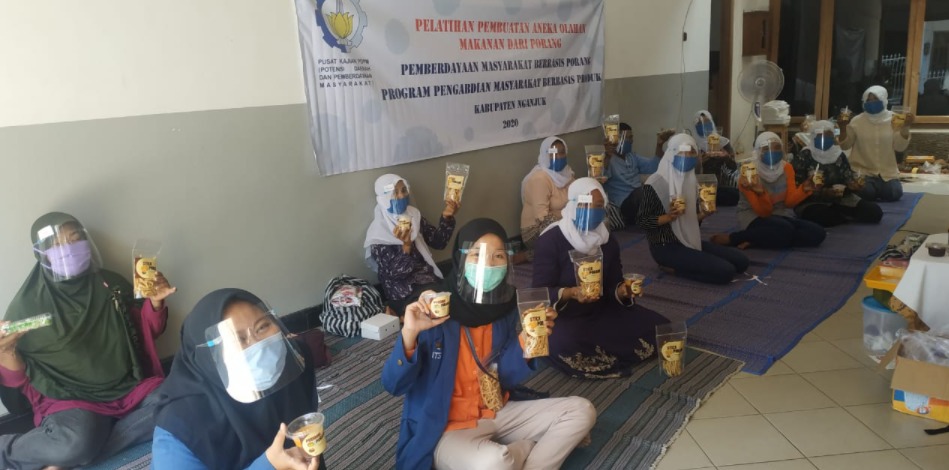
Training on the manufacture and packaging of porang processed products carried out offline under the Covid-19 health protocol
ITS Campus, ITS News – Even though it has the rich potential of porang plants porang cultivators in Nganjuk Regency are still classified as poor. Moved to help the economy of these cultivators, the ITS community service team (abmas) and real work lecture (KKN) implemented ergonomic porang cutting and drying tools.
The tool was designed by the Community Service Team and ITS KKN, chaired by Dr. Ir. Eko Nurmianto MEngSc is support for processing porang plants into various kinds of high economic value products. So that it is expected to be able to boost the economy of the local community.
Nganjuk Regency has an area of approximately 122,433 hectares, of which 49.9 percent or 61,127.2 hectares of which are forests. The existence of the forest is very important for the Nganjuk community because it has an economic function as essential life support. The great potential that the Nganjuk forest keeps is the porang commodity, one of which is in Macanan Village, Loceret.
Porang or Amorphophallus oncophillus is a non-timber forest commodity whose main product is tubers. Porang tubers, if further processed, can produce a variety of products, such as food processing materials, paper industrial blends, glue-making materials, textile materials, and insulating materials in the electrical industry.
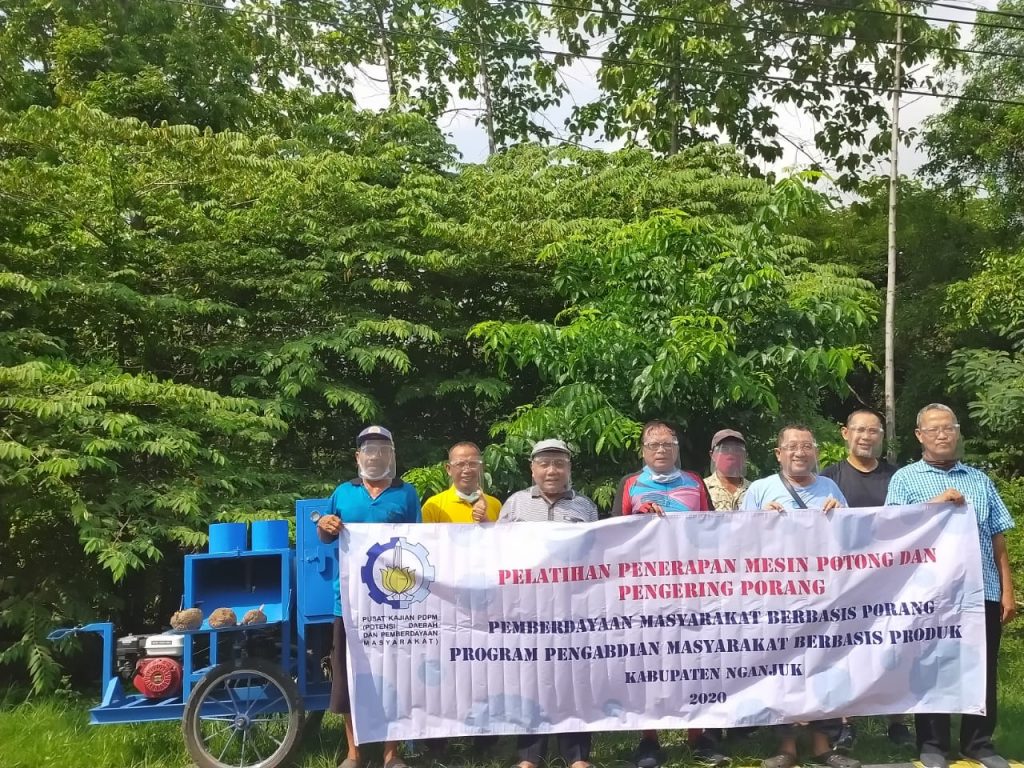
Five ITS lecturers who are members of Abmas porang together with their fostered partners in Nganjuk
Although they have a lot of potential for porang, there are still many cultivators whose lives are still less prosperous. Various ways have been taken to increase the competitiveness and selling power of porang from their cultivation. However, there are problems in the form of a lack of quality human resources (HR) and routine coaching. Departing from this gap, the abmas and KKN ITS team is determined to help improve the welfare of porang cultivators, especially in Macanan Village, Loceret.
Together with Eko, four other ITS lecturers are also part of the ITS community service and KKN team. The four of them are Ir Arino Anzip MEngSc, Ir Witantyo MEngSc, Prof. Dr. Ir Udisubakti Ciptomulyono MEngSc, and Dr. Soehardjoepri MSi. Besides, there are also 10 ITS students who help with Community Service and Community Service activities by the ITS Center for Regional Potential Development and Community Empowerment (PPDPM) Studies.
The ITS team saw that the porang in Nganjuk had great potential to be developed into a leading economy. Starting from porang tourism, porang education, and developing porang export potential, it is very possible to realize the abundance of porang there. Steps taken by Eko and the team were transforming porang into various processed products with high economic value. This idea arose because previously the porang harvest was sold directly in the form of tubers, so the yields for farmers tended to below.
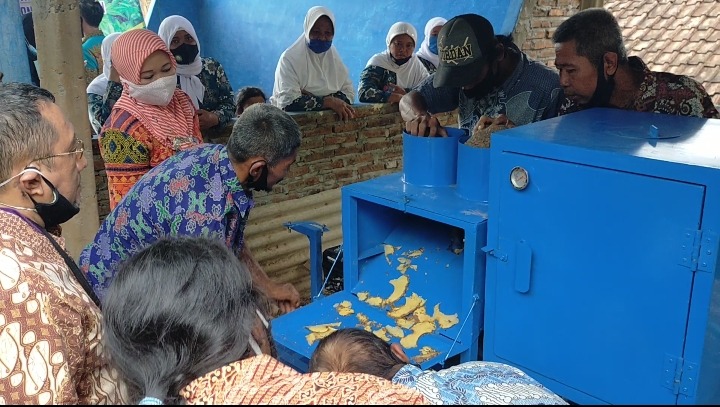
Demonstration of the use of a porang dryer and cutter was witnessed by fostered partners in Macanan Village, Loceret, Nganjuk
Not many people know that porang is a commodity that is in high demand, even abroad. In 2018 there were 254 tonnes of porang exports to Japan, China, Vietnam, Australia, and others, which reached Rp. 11.31 billion. This large demand figure, if it is used optimally by selling processed porang products, the profit earned by cultivators will increase. “That way the people’s welfare can increase,” he said hopefully.
To realize the product diversification of the ITS Team’s idea, the Loceret community is equipped with porang cutting and drying tools. This tool is the result of research on the design and construction of a porang cutting and dryer machine prototype carried out by Eko and his two colleagues Ir Arino Anzip MEngSc and Dwi Endah Kusrini SSi MSi which was completed in 2019.
This tool is used to replace conventional cutting methods that still use knives or traditional surrender. By using this tool, the round porang tubers turn into porang chips without using human labor, so that forest farming communities can increase their productivity.
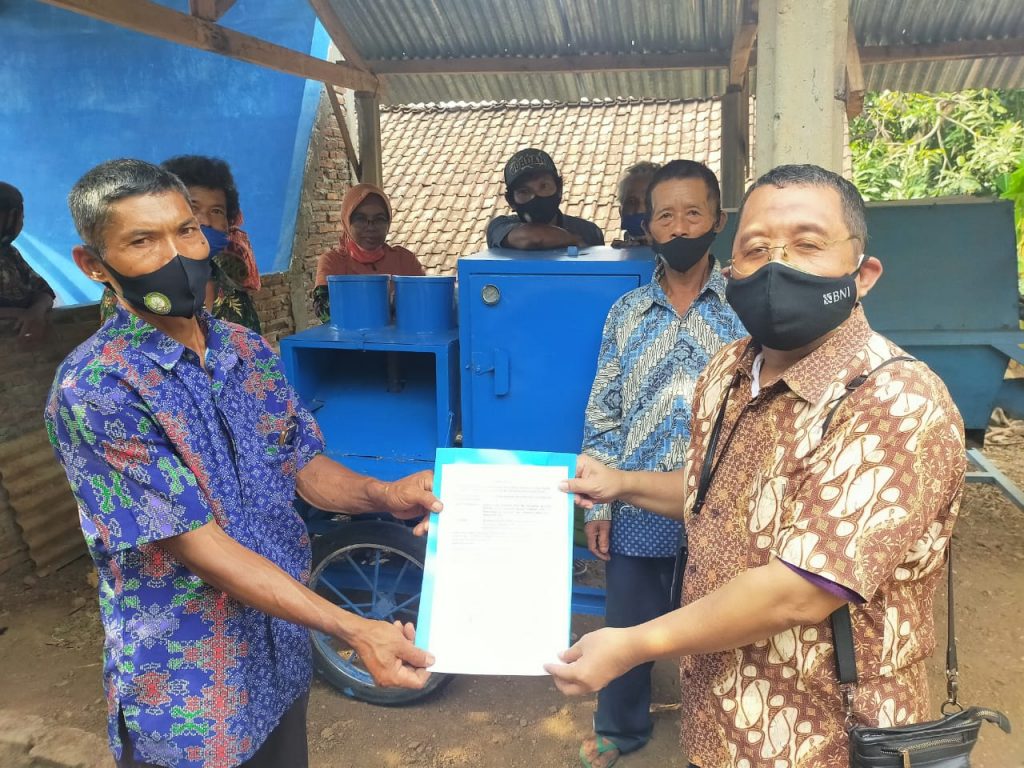
Handover of machines from Dr. Ir Eko Nurmianto MEngSc (right) to the Chairman of the Nganjuk Forest Farmers Group
The chips or pieces of porang are then put in a dryer to be heated until they reach a temperature of 70 degrees Celsius. Eko said that this temperature is adjusted to the heat obtained when the porang pieces are heated for about a day in the sun. By utilizing the porang cutting and dryer machine, the processor can cut approximately 30 kilograms per hour and can dry the porang pieces in just three to four minutes.
“After that, the porang will be mashed into flour which can then be used for various high economic value preparations,” explained the lecturer at the ITS Industrial and Systems Engineering Department. Processes developed from porang flour carried out by fostered participants in Macanan Village, Loceret include porang crackers, porang cake, porang meatball, jelly art, porang noodles, porang sticks, porang nuggets, dawet porang, and porang pudding.
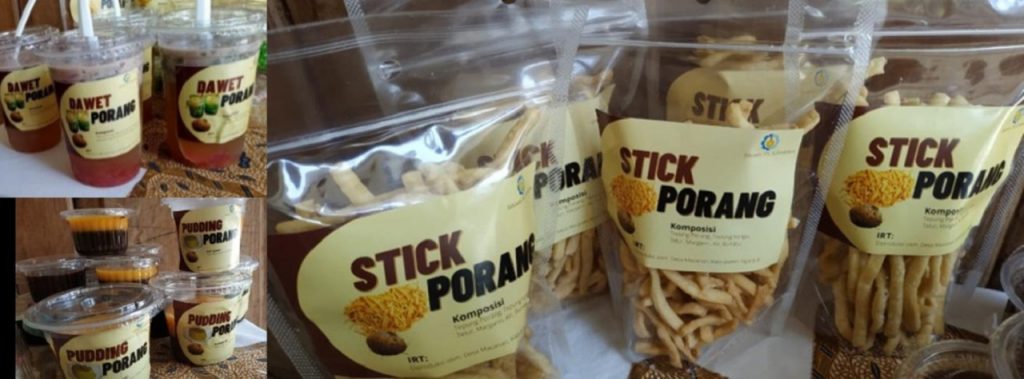
Porang processed products produced by fostered partners are dawet porang (top left), pudding porang (bottom left), and stick porang (bottom right)
In addition to helping train people in the application of cutting and drying machines and processing porang into processed products, Eko and his team also helped train several things that support the success of this entrepreneurship. Namely training and product packaging practices, capital and finance, as well as selling techniques and market management. “These three components are very important so that the sustainability of the porang processing business can be realized,” he added.
Eko hopes that the effort to develop porang, which has been initiated since 2016, will continue to grow so that it can reach a wider area. This ergonomist hopes that local governments can expand empowerment and mentoring activities in other places and create connectivity for developing people and tourism for people. Which in the end will create an image in Nganjuk Regency as a city with the potential of people who can provide benefits and economic advantages for the local community. (ram/ris/ITS Public Relations)
Related News
-
ITS Collaboration with BPBD East Java, Launching VR Disaster Simulation
ITS Campus, ITS News — Supporting anticipation of disasters and continuing to educate the public, Institut Teknologi Sepuluh Nopember
November 23, 2020 17:11 -
Supporting the Implementation of Innovative Ideas, ITS and IYSA Hold International Competition
ITS Campus, ITS News — Institut Teknologi Sepuluh Nopember (ITS) has once again proven its commitment to supporting the
November 23, 2020 17:11 -
ITS Maintains Informative Qualification for Five Consecutive Years at KIP Awards
ITS Campus, ITS News — Institut Teknologi Sepuluh Nopember (ITS) has once again successfully maintained its Informative Qualification predicate
November 23, 2020 17:11 -
ITS Strengthens Smart Eco-Campus through UI GreenMetric 2024
ITS Campus, ITS News — Institut Teknologi Sepuluh Nopember (ITS) has once again demonstrated its commitment to environmental concern
November 23, 2020 17:11
